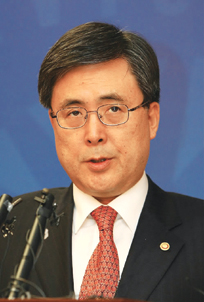Stable Financial Market Top Priority
New FSC Chmn. Chin holds meeting with banks to persuade them to boost capital funds in order to expand loans
 WhChairman Chin Dong-soo met with bank presidents on Feb. 15 to discuss the provision of loans to SMEs in financial trouble and was able to work out some of the dire problems in that area.
WhChairman Chin Dong-soo met with bank presidents on Feb. 15 to discuss the provision of loans to SMEs in financial trouble and was able to work out some of the dire problems in that area.
All nine heads of the banks at the meeting agreed to extend the maturities of loans, including those on credit, without guarantees, which have been the biggest problem for SMEs.
The Financial Services Commission also found a way to have banks increase their capital to boost their BIS ratios by setting up a fund from which the banks could draw to raise their capital. All of the bank heads at the meeting agreed to draw funds from the projected fund to expand their capital funds. The banks have been reluctant to borrow from the public fund, fearing that it might hurt their financial credit ratings.
In the meantime, Chairman Chin Dong-soo said he will give priority to policies designed to stabilize the financial market without financial risks and to provide support to the real economy so that growth potential would not be downgraded.
The new FSC chairman, during his first media conference on Feb. 10, said a BIS ratio of 10 percent should be sound enough for Korean banks and the FSC will see that the ratio is maintained at that level. The FSC advised banks to maintain a 12 percent BIS ratio so that they can increase loans to help in corporate restructuring and stabilize the real economy. He said banks don't have to stick with the ratio.
The top official at the FSC said the commission can't do anything to banks that allow their BIS ratio to slip below the 12 percent level because the financial watchdog asked the banks to supplement their capital so that they can provide enough loans to corporations that want to undertake restructuring and to help the limping economy recover as early as possible with enough liquidity to go around.
The chairman also said it is not the time to unleash public funds. He believes the government should wait until the economy shows signs that its growing worse and the soundness of banks' operations are further eroded, requiring bailout funds. As he sees it, the banks are still sound enough as far as their BIS ratios are concerned, although the FSC will continue to monitor the situation to see if any bank has a critical need for funds.
Touching on corporate restructuring, Chin said banks should determine whether their corporate borrowers need restructuring or not. The government will determine the impact of those borrowers on the economy and take actions to upgrade Korean industries' competitiveness through policies.
The FSC can support the restructuring through the Corporate Financial Reform Support Team, a civilian consultant group, and the Real Financial Support Council.
The FSC will also support restructuring through the financial market by extending funds for restructuring and assisting in the sale of corporate assets. Another way is to create a fund either by the Korea Asset Management Corp. or the Korea Development Bank with the participation of civilian investors. Chin suggested that he will lead the corporate restructuring if needed. He also revealed that expert matters for setting up 20 trillion won in funds to help banks expand their capital in emergency cases have already been completed.
Chin also said the FSC will take actions to help stabilize the bond market's operation so that a business in a temporary financial pinch can get its problems resolved through the bond market.
The FSC has also been looking into ways to add liquidity to the financial market to help with M&As that develop during the process of restructuring or settling debts.
On providing support to SMEs and poor households, he said he will see that free work-out being undertaken by banks for its borrowers will be expanded to multi-borrowers, meaning borrowers that have loans from more than one bank. The FSC will also make sure that the micro-credit system is spurred to prevent damages from the use of funds borrowed from loan sharks.
On the possibility of a foreign exchange crisis recurring, Chin said the foreign exchange fund situation has improved greatly due to the swap agreements with the United States, Japan and China, the current level of foreign exchange reserves and an adequate level of banks foreign exchange funds, substantially easing the foreign exchange funding situation for Korean banks.
In the meantime, the FSC said Moody's revision of credit ratings for Korean banks doesn't mean downgrading, only changes in credit rating methods. The FSC referred to the credit agency's changing credit ratings of Korean banks to match the sovereign credit rating for Korea, A2 from A1 for Hana, Aa3 for the Industrial Bank of Korea, Aa3 for Korea Development Bank, A1 for Nonghyup, A1 for Shinhan and A1 for Woori Bank. Moody's provides credit ratings for banks including the ability of government support for securing foreign exchange funds by banks, giving higher ratings to banks than the sovereign credit rating, the FSC said. nw
Chairman Chin Dong-soo of the Financial Services Commission.
3Fl, 292-47, Shindang 6-dong, Chung-gu, Seoul, Korea 100-456
Tel : 82-2-2235-6114 / Fax : 82-2-2235-0799